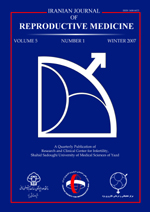
|
International Journal of Reproductive BioMedicine
Research and Clinical Center for Infertility, Shahid Sadoughi University of Medical Sciences of Yazd
ISSN: 1680-6433
EISSN: 1680-6433
Vol. 12, No. 5, 2014, pp. 313-320
|
 Bioline Code: rm14044
Bioline Code: rm14044
Full paper language: English
Document type: Research Article
Document available free of charge
|
|
|
International Journal of Reproductive BioMedicine, Vol. 12, No. 5, 2014, pp. 313-320
| en |
Expression of Glycogen synthase kinase 3-β (GSK3-β) gene in azoospermic men
Nazarian, Hamid; Novin, Marefat Ghaffari; Jalili, Mohammad Reza; Mirfakhraie, Reza; Heidari, Mohammad Hassan; Hosseini, Seyed Jalil; Norouzian, Mohsen & Ehsani, Nahid
Abstract
Background: The Wnt/β- The Wnt/β-catenin signaling pathway is involved in many developmental processes in both fetal and adult life; its abnormalities can lead to disorders including several types of cancers and malfunction of specific cells and tissues in both animals and humans. Its role in reproductive processes has been proven.
Objective: This study was designed to evaluate the expression of the key regulator of this signaling pathway GSK3-β and its presumed role in azoospermia.
Materials and Methods: WNT3a protein concentration and GSK3-β gene expression levels were measured and compared between two groups of infertile men. The test groups consisted of 10 patients with obstructive and 10 non-obstructive azoospermia. The control group was selected among healthy men after vasectomies that were willing to conceive a child using a testicular biopsy technique. Samples were obtained by testicular biopsy and screened for the most common mutations (84, 86 and 255) in the SRY region before analyzing. GSK3-β gene expression was assessed quantitatively by real time-PCR.
Results: The WNT3a protein concentration had no significant difference between the two test groups and controls. Expression of GSK3-β was down-regulated in non-obstructive azoospermia (3.10±0.19) compared with normal (7.12±0.39) and obstructive azoospermia (6.32±0.42) groups (p=0.001).
Conclusion: Down-regulation of GSK-3β may cause to non-obstructive azoospermia. Regulation and modification of GSK-3β gene expression by drugs could be used as a therapeutic solution.
Keywords
Azoospermia; Wnt signaling pathway; glycogen synthase kinase 3 beta; Spermatogenesis
|
| |
© Copyright 2014 - Iranian Journal of Reproductive Medicine
Alternative site location: http://www.ijrm.ir
|
|
